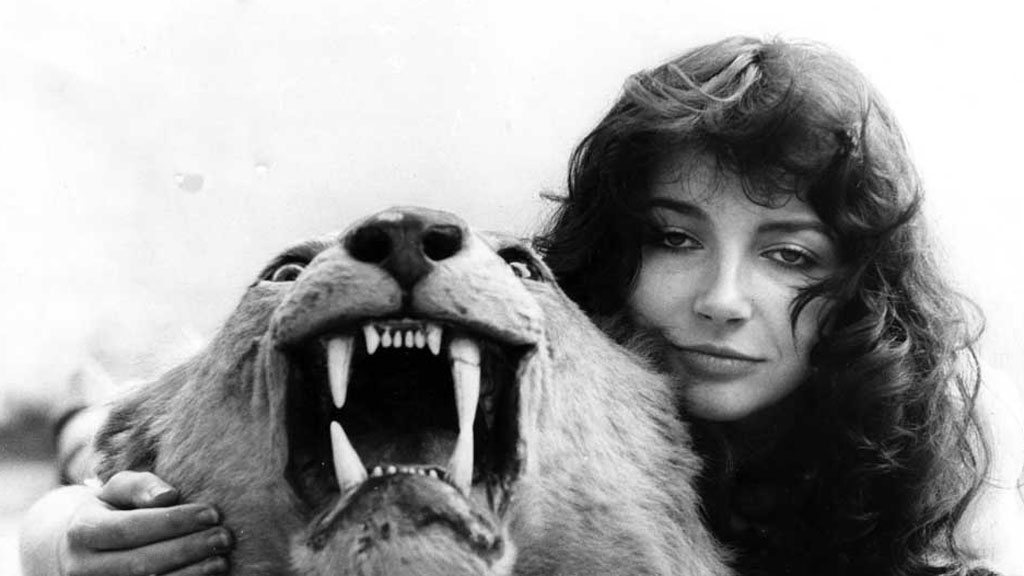Kate Bush comeback: why there’s thunder in our hearts
News that Kate Bush is returning to the stage sent social media into meltdown. But this ain’t just the internet in overdrive: a fan who saw her last 1979 tour tells us what the fuss is all about.

Outkast, Tricky, Goldfrapp, John Lydon (Johnny Rotten), Rufus Wainwright, PJ Harvey, Radiohead, Florence and the Machine, and Bjork: just a handful of the artists who reference Kate Bush as a major influence.
But that is not the only reason her surprise announcement of a 15-date London residency caused minor tremors across the internet – and almost instantaneous anxiety about getting hold of a ticket.
The elusive songstress has only ever toured once, back in 1979, and despite continuing to record albums – her most recent in 2011 – she has only made a couple appearances in public since. There are a few theories about why this may be: a rumoured fear of flying is one, along with the lasting impact of the death of a member of the lighting crew, Bill Duffield, on the opening night.
There was very little of the ‘hello Liverpool’, and I think that does reflect her personality. Steve Fletcher
But Graeme Thomson, author of Under the Ivy: The Life and Music of Kate Bush, says the sheer physical demand of her first epic six-week tour of Britain, with its multiple costume changes, role-plays, stage craft and theatrics, put her off performance for good.
“She was very young, just 20-years-old, and it put her under an enormous amount of pressure,” he told Channel 4 News. “The impact it had on her as a person shouldn’t be underestimated: she’s naturally private, not a particularly extroverted person, and all the scrutiny was difficult to handle.”
In the rare interviews she has given, she also mentioned that family was her priority for a time, and it is no coincidence that she has decided to step back on stage when her son, Albert, reached his teens. She told BBC Radio 4’s Front Row back in 2011: “At the moment my family life is incredibly important to me and it comes first. Then my work fits in around it, which is quite easy to do with the recording process.
“But something like doing shows would be incredibly disruptive and I just can’t see that would be something that would work at this stage.” It seems that low-key is not at option for this performer, who was the pioneer of the epic stage show.
‘Punk had been and gone… I was just amazed’
When he went along to Liverpool’s Empire on 3 April, 1979, the 18-year-old Steve Fletcher had never experienced anything like it. “I’d seen Bowie, Queen and Alice Cooper before. A lot of them have got theatrical elements within a stage performance. But I was just amazed,” he says, the memory still vivid 35 years on.
The Liverpool audience that managed to get tickets to her sold-out show were “fairly clued up”, Mr Fletcher adds: “Punk had been and gone, but you’d started to have other female role models – like Siouxie Sioux. A lot of women would have admired her.
“I suppose the attraction was: she’s gorgeous and I was an 18-year-old lad. But she also had a completely different vocal style to everyone else, certainly for a female, and someone that young.”
She’s naturally private, not a particularly extroverted person, and all the scrutiny was difficult to handle. Graeme Thomson
As for the show itself, Mr Fletcher remembers steel balls floating out into the audience – “it impressed me at the time” – with juggling and magic tricks being performed on stage. There were video projections, performance art and poetry. But Bush was also the first musician to use a headset microphone, allowing her to sing and dance at the same time.
Ms Bush herself was totally wrapped up in every song: “There was very little of the ‘hello Liverpool’, and I think that does reflect her personality,” Mr Fletcher recalls. “It seems weird to me that you can go out and perform, but then be very shy… She was playing a role on stage.”
From 1979, to 2014
This was pre-internet, of course: there were no camera phones trying to film every moment, or tweeting instant reaction. YouTube was not on the scene for another 25 years, and because this was just the second night of the tour, NME and Melody Maker had yet to publish reviews, so Mr Fletcher and the other 4,000-odd Liverpudlians had little inkling of what to expect.
But fast forward to 2014, and hundreds of thousands of fans may be as much in the dark about the new show. “Theatrically and dramatically, I don’t know what she’s got planned. Will she present old songs in a straight way?” says Mr Thomson.
In terms of musical direction, she appears to have turned a full circle: from lyrical, pop-led songs of the late 1970s and 1980s, through an experimental electronic period, before coming back to basics with 50 Words for Snow in 2011.
But few will speculate on what 2014 holds for Kate Bush. What we can expect is that she will surprise – and take a risk, adds Mr Thomson. “She follows her own vision, and that’s what people tap into. Who knows what’s to come… But the anticipation is part of it.”